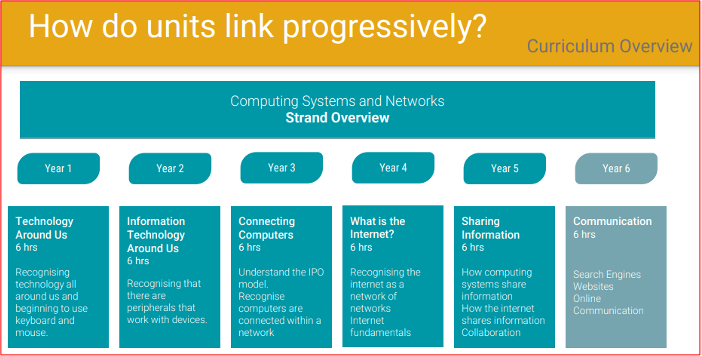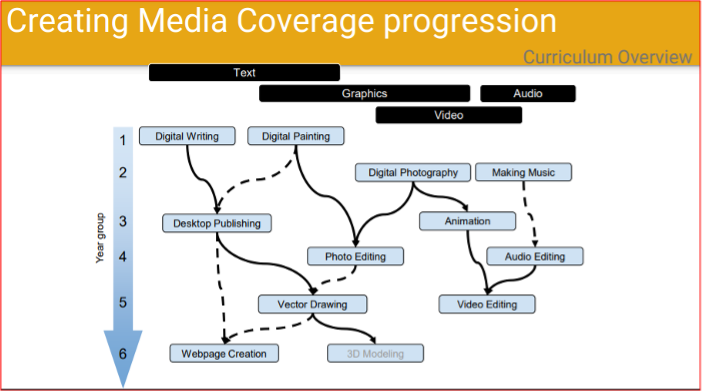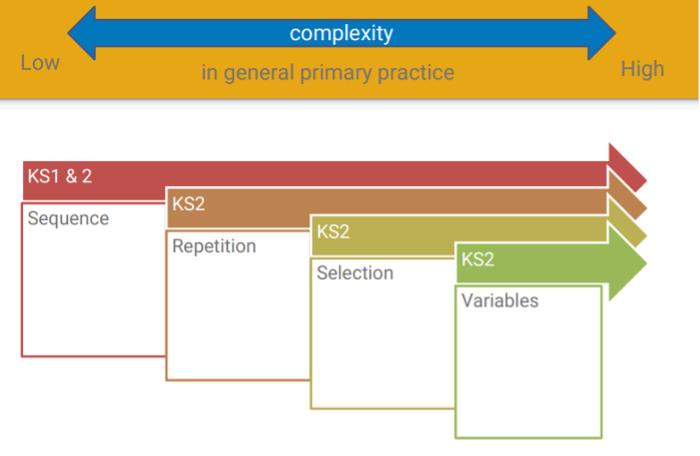Our curriculum is ambitious, diverse and research driven
INTENT
At Hunsbury Park Primary School, we want pupils to be masters of technology and not slaves to it. Technology is everywhere and will play a pivotal part in students' lives, therefore, we want to model and educate our pupils on how to use technology positively, responsibly and safely. We want our pupils to be creators not consumers and our broad and diverse curriculum, encompassing computer science, information technology and digital literacy, reflects this. We want our pupils to understand that there is always a choice with using technology and as a school we utilise technology to model positive use. We recognise that the best prevention and protection for a lot of issues we currently see with technology/social media is through education.
We recognise that technology can allow pupils to share their learning in creative ways. We also understand the accessibility opportunities technology can provide for our pupils. Our ambitious and knowledge rich curriculum has to be balanced with the opportunity for pupils to apply their knowledge creatively, which will in turn help our pupils become skillful computer scientists.
The computing curriculum follows the Teach Computing resources for Years 1-6, with Early Years using units and resources from the ilearn2 website. However, we encourage staff to try and embed computing across the whole curriculum to make learning creative and accessible. We want our pupils to be fluent with a range of tools to best express their understanding and hope that by Upper Key Stage 2, children have the independence and confidence to choose the best tool to fulfil the task and challenge set by teachers.
The school embarked on an accreditation scheme with National Online Safety to ensure all pupils, staff, governors and parents were well versed on online safety. This is now being covered by National College and during Safeguarding training in school. CPD will continue to be a high focus this year and implementing the computing curriculum both as a stand-alone, discrete subject and across the curriculum too.
At Hunsbury Park Primary School, we believe that the study of Computing and the use of ICT plays an important role in the development of children’s education, preparing them for today’s diverse and technological world. Within the teaching of Computing, pupils will be taught a range of skills incorporating investigation, communication and control. The use of ICT can also enhance and extend pupil’s learning across the curriculum, developing important learning points, whilst clarifying explanation and embedding knowledge. We aim for the children to confidently and independently use and apply information technology skills to support and extend their learning. We develop a culture where the use of Computing and the use of ICT becomes second nature to our pupils, thus ensuring they are ready and able to embrace the technological advances of the future.
The school has a wealth of technology, including a renovated and furnished computing suite with a combination of desktop and laptop computers, a bank of iPads and a ban of portable laptops in order for children to access the computing curriculum, as well as use technology across the curriculum. This enriches the learning experiences of children across both key stages. Every child has at least one session in the Computing suite each week and will regularly use desktop computers, laptops or iPads to support their learning in other areas of the curriculum. Children at EYFS and Key Stage 1 have access to desktop computers and iPads in their classrooms.
Fully immersed in computing, the children are taught using Interactive Whiteboards and visualisers, voice recorders, data loggers and numerous other technologies. These play an important role in establishing a fully integrated approach to computing teaching. Our children are taught how to access information, evaluate its suitability, store it, share it with others and tailor it to meet their own needs.
In each year group, the children learn how to navigate the Internet safely and communicate respectfully through emails in KS2. In line with this, all children and parents sign a user agreement at the beginning of the year to ensure that all members of the school's community understand the e-safety policy and what is deemed acceptable when using the school’s technology and when using technology outside of school.
The Teach Computing Curriculum is designed to give excellent coverage for children to explore and understand both Computing plugged and unplugged concepts in depth. Through the Computing Progression of Skills, the subject will interweave prior content with new concepts. This practice and consolidation will help the children to grasp the links between topics and to understand them more deeply.
Weekly opportunities of accessing the computing suite are mixed with Computing being taught across the curriculum.
Teachers are aware of all the objectives through the Computing Curriculum Map and Progression of Skills information and through the Computing Policy and the Online Safety Policy.
IMPLEMENTATION
We have mapped out the curriculum units to ensure comprehensive progression throughout the pupil’s learning journey. The curriculum is a spiral curriculum with units building progressively year on year. See examples below:


We acknowledge that at Key Stage 2 programming needs more careful consideration to ensure that pupil’s do not have gaps in their learning. Regarding the National Curriculum objective “use sequence, selection, repetition in programs; work with variables and various forms of input and output”, we have ensured that each skill is covered in each cycle.

At Hunsbury Park, we feel that most of the computing should be embedded across the curriculum, but once a week, during the one-hour timetabled slot, computer science should be taught. The timetabled computing session focuses on one of two elements: An Explicit Computer Science lesson or A Tinkering Session. The computer science part of the computing curriculum will often, but not always, need a more explicit approach. That is not to say it can’t be embedded across the curriculum.
For the discrete, once a week computing lessons, children will have a settling in activity, retrieval of previous learning, whether this be the week before or in previous weeks. This will be followed by the main lesson, modelled by the teacher, with challenges available for the children who may need it and support for those children who require extra assistance. To end there is a plenary and a chance for the teacher to assess the children’s learning. To support the children in becoming independent learners, the adults will guide the children in their task and if the children work in pairs, one of them will be the driver, whilst the other will be the navigator. The driver is in charge of the mouse and the keyboard, whilst the navigator supports the driver in what is needed to be done, the navigator is not allowed to touch the mouse or the keyboard, this is to ensure that no one child takes over the team activity. The children work in these roles part of the lesson and then swap roles to ensure both have experience in that role.
A tinkering session looks at introducing a new app or tool and giving children opportunity to experiment and familiarise themselves with the different elements and tools before it can be applied in a more focused approach across the curriculum.
Computing can be covered by using technology to demonstrate learning in other subjects. For example: If a Year 6 class were covering World War 2 and were exploring how the Second World War started, the children could be set the task of creating a video explaining this. First, the children may want to research some more information about how the Nazi party rose to power. This would involve covering some Digital Literacy: Managing Online Information
For consistency and quality first teaching, we ensure there is ongoing CPD for all staff and sharing of learning in staff meeting. All staff are encouraged to undertake computing CPD appropriate to the key stage and year group and this is recorded by the Computing Subject Lead.
The Computing Subject Lead also undertakes CPD for all Year Groups and Key Stages and will share their knowledge and learning with the appropriate members of staff. There are shared planning opportunities and resources are available to support the planning and deliverance of the Computing curriculum. The Computing Subject Lead also regularly attends computing meetings with other schools in the local area.
IMPACT
We encourage our children to enjoy and value the curriculum we deliver. We will constantly ask the WHY behind their learning and not just the HOW. We want learners to discuss, reflect and appreciate the impact computing has on their learning, development and well-being.
Finding the right balance with technology is key to an effective education and a healthy life-style. We feel the way we implement computing helps children realise the need for the right balance and one they can continue to build on in their next stage of education and beyond. We encourage regular discussions between staff and pupils to best embed and understand this. The way pupils showcase, share, celebrate and publish their work will best show the impact of our curriculum. We also look for evidence through reviewing pupil’s knowledge and skills digitally through tools like Microsoft Teams and observing learning regularly.
Progress of our computing curriculum is demonstrated through outcomes and the record of coverage in the process of achieving these outcomes. For online safety, the knowledge maps on Project Evolve are used to inform teachers of their children’s prior learning and the teaching they require. Assessment of each of the progression of skills will also be highlighted by the class teacher and recorded on Insight tracking.
The Computing Subject Lead regularly carries out pupil voice, staff voice, learning walks, book looks and work and planning scrutiny to ensure the children’s learning of the content is as outlines in the curriculum and regularly checks the data on Insight.
SEND AND DISADVANTAGED PUPILS
At Hunsbury Park Primary School, we have a goal to prepare all pupils to become active participants in a digital world through the effective delivery of the computing curriculum. By harnessing effective pedagogy, teachers create lessons that are inclusive by design and benefit all pupils whether they have special education needs, are disadvantaged or not.
It is important to recognise that students with special educational needs and disabilities are individuals, and may experience more than one, or none, of the barriers to learning. Furthermore, what works well for one learner may not be appropriate for another. Individuals with SEND may also have particular strengths in the classroom, for example, creativity, attention to detail, or an ability to visualise a problem in a different way. These are as important to consider as the difficulties that they face.
Whatever level children and young people are working at, valuable learning can be found in the Computing curriculum. It can also be a lot of fun, and offer them opportunities to achieve in ways that are not easily available in the rest of the curriculum.
How Does Computing Promote British Values?
Computing promotes British Values through the children learning to understand rules and why they are important, this is applied to the children’s learning of how to use the internet to search and communicate safely. This relates to appropriate conduct and to laws in place in this country regarding such activity. Freedom of speech and the right to make choices are discussed in the computing curriculum whilst at the same time being a respectful digital citizen to remain safe and to respect others. As children move through the school, they learn more about using technology in a positive way and how to leave a positive digital footprint as what they say has an impact on their lives and the lives of others. They also learn about keeping safe and making informed choices and decisions, including what to do if they feel uncomfortable with any online material they see.
